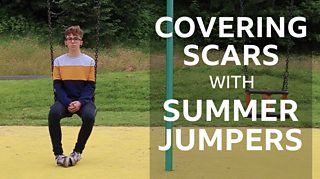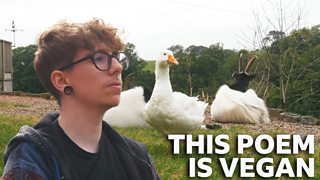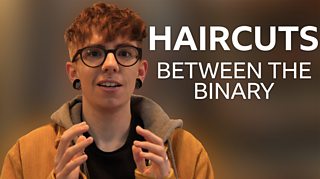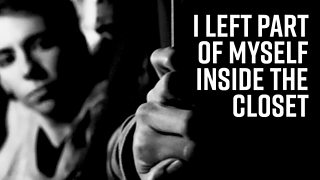'I write poetry about my trans experiences because it's important we are seen'
By Gray Crosbie // Βι¶ΉΤΌΕΔ The Social contributor // 4 February 2021
Long before I came out as non-binary, I was very aware that I felt uncomfortable whenever I was referred to with gendered language. Words like lady or miss felt like a stab to the chest; she and her made my insides squirm. Being referred to as someone’s daughter, girlfriend, niece - terms meant to express your belonging within family, instead made me feel as though the people closest to me had no idea who I was.
Despite knowing these words made me uncomfortable and feeling desperate to move away from them, I had no idea which words to move to. It seemed to me as though there was a hole in our language, a giant void, where words to describe people like me should be.
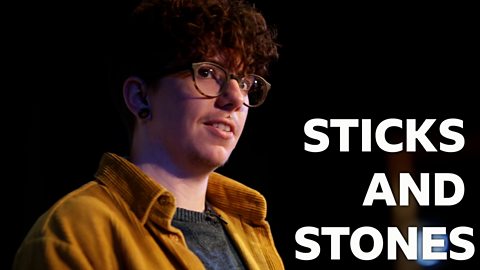
Sticks and Stones | A Poem By Gray Crosbie
A spoken word piece by Gray Crosbie on the importance of language and identity
When I first learned of terms like genderqueer and non-binary, and the use of singular they as a pronoun, it seemed an exciting possibility. However I didn’t know anyone who actually used words like those and if internet opinions were anything to go by, the people who did use them deserved only ridicule. I couldn’t imagine these unfamiliar words fitting me, or how I could possibly ask other people to suddenly incorporate them into their vocabulary just for my sake.
I remember wishing that I could hide for a decade or so and re-emerge once the gender-neutral words we need have been through all their awkward evolutions and become an everyday part of the English language. I wished I could simply step into a time where I could tell a new employer I was non-binary and they would understand without needing the most intimate details of my gender explained or a lesson on Trans 101. When telling someone I use they/them pronouns is no more remarkable than mentioning the colour of my eyes.
But I know if we want change then we need to make it happen.

One of the reasons I wrote Sticks and Stones was to help me explore and make sense of day to day life, particularly that which relates to being trans. Doing so also gives me a way to share my experiences with other people who might be going through something similar.
It wasn’t until I got to know other non-binary people, and see them boldly and unapologetically be themselves, that I gained confidence to be who I am. Knowing there are other people like you out there can make so much difference.
Quite often my videos receive a lot of negative feedback, but if my poetry has helped even one person feel like they are less alone or informed a parent on how to better understand and support their trans child, then it is more than worth all the hateful comments.
Making videos such as this one also allows me a way to share my trans experiences with people out with the trans community. What’s particularly beneficial about sharing information in this way is that it allows me to do so on my terms.
While I’m usually happy to help folk better understand trans issues, doing so on a day to day basis, often through unexpected questions, can be emotionally exhausting. Also, with trans lives being so wrapped up in politics and media debates, I think art in all forms can be a great way to help humanise these issues and help people better understand our experiences and the challenges we face.
On an average day I’ll be misgendered more often than I’m gendered correctly. I often must weigh up whether it’s more uncomfortable to just accept being called he or her, or correct them and face the potential questions and confrontation that often comes with. Because there is still so much resistance when it comes to acknowledging non-binary identities and using gender neutral pronouns.
It’s almost guaranteed that as soon as they/them pronouns are mentioned at least one person in the room is suddenly an English teacher. They argue they can’t bring themselves to use words that aren’t grammatically correct, yet are conveniently able to ignore the fact that singular “they” has been used since Shakespearean times.
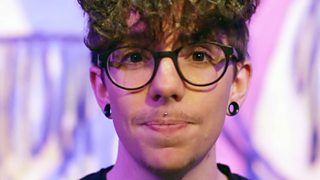
Examples of the ways in which we use singular they without even noticing; “we have a new teacher today, I hope they’re nice” are also conveniently brushed off and ignored. I find it bizarre that when it comes to trans rights people suddenly care more about grammar than they do about their friends and family.
Transphobia can be so easily internalised. Even now there are days I find myself questioning the legitimacy of my pronouns and whether I do have the right I do have to ask people to change the way they speak, to demand they learn new words and accommodate me, but non-binary people deserve validation.
We exist, we always have existed and we deserve to be included and acknowledged in ways we haven’t been up until very recently. And that means having words to describe ourselves, the words we decide fit, and for those words to be respected.
I do understand that change can be tough, and I know it seems as though gender-neutral language has appeared into our lives quite rapidly. But that’s because we’re making up for lost time. Too many lives have been lost to transphobia. And for many of us things still aren’t changing fast enough.
I write poetry about my trans experiences because I believe it’s important that we are seen and represented, that our struggles are documented in ways they mostly haven’t been up until now. And not just in the political gender wars and media debates, but in the places that capture our complex and beautifully diverse lived experiences: in novels, photographs, theatre – and poetry.
